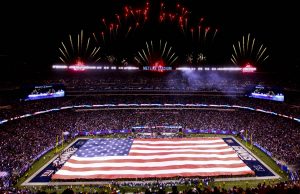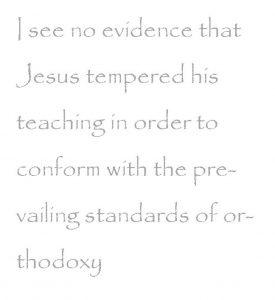Taking a Knee and the Importance of Being Yourself

CC-BY
NFL Quarterback, Colin Kaepernick’s provocative gesture of kneeling during the playing of the National Anthem has–thanks to President Trump’s tweeted scorn of the behavior–blown up into a nationwide conversation this weekend. Kneeling, fist raising, sitting, arm-linking have politicized America’s most popular and increasingly controversial game.
Kaepernick explained his “take a knee” gesture back in 2016:
…I am not going to stand up to show pride in a flag for a country that oppresses black people… To me, this is bigger than football and it would be selfish on my part to look the other way. There are bodies in the street and people getting paid leave and getting away with murder…
Kaepernick’s gesture has been answered with emotional responses both endorsing and condemning. President Trump, speaking at a political rally in Alabama, offered his own unvarnished condemnation of Kaepernick and the other athletes who have joined his protest:
…when somebody disrespects our flag, [team owners need to] ‘Get that son of a bitch off the field right now, out, he’s fired. He’s fired,’
As I write this, the Take A Knee phenomenon has drawn hundreds of athletes and entertainers and, in one case, even team owners into its vortex. It’s difficult to say whether the protest is against the President, or the death of Black men, or what. Whatever it all means people are thinking about our rituals. What is genuinely American is a topic of conversation. Some fans and players are reviewing aloud the importance and place of football. Take a Knee is a gloriously energizing and chaotic phenomenon.
Systems Thinking
Nowhere is individualistic behavior and statements, such as those of Colin Kaepernick, better understood than in the insights of Family Systems Theory. Family Systems is a branch of psychology that sets aside the medical focus on an individual and pays attention to how whole families or even organizations operate. Family Systems teaches that groups of people can have emotions. The most interesting emotion for a family or community is generalized anxiety. Anxious systems hate trouble-makers because they require energy to suppress. Healthy systems, on the other hand, tolerate individual protest in a relaxed constructive way. The business, church, or household that is operating in a healthy way can tolerate one of its members doing something a bit crazy. If Dad has a steady paycheck and the other kids are getting good grades, a household is able to take in stride little sister’s desire to spend the summer in Colorado. The employee of a profitable well-led business who realizes that a product line is dangerous to customers can express this concern and attract a healthy corrective response by management.
The anxious system—North Korea, the household with a opioid-addicted mom, the church losing members—encourages herding. It’s important that everyone behaves and thinks (or pretends to think) in the same way. When a system’s members respond to stress with knee-jerk reactions; when conformity feels indespensible; when blame is affixed to the weakest member in the system; when solutions need to happen right now; when leaders are emotionally tossed about by the feelings that are flying through the group at any given moment, it’s a safe bet that the whole system is under stress.’
Family Systems goes on to observe that the ideas or actions of the non-conformist create an automatic counter action by the rest of the group to restore group equilibrium.
Just reading this list of anxious reactions sheds light on what Colin Kaepernick is stirring up and the kind of pressure he must be feeling. I’m awed by his fortitude in the face of what is obviously an anxious situation. The NFL is losing ticket sales and TV viewership, the head-trauma problem will either change the game fundamentally or bring it to an end. It follows that professional football does not need its players calling attention–during the National Anthem of all time–to another sticky problem, namely police shootings of young Black men. And most significantly, the Take a Knee protest has fostered a host of counter-balancing measures–the President’s Alabama comments included.
What Does Faith Have to Say?
Of course, biblical faith says nothing about football or the TakeAKnee phenomenon. And, to be honest, religion, all brands of religion, are essentially conservative operations. By “conservative” I mean that religion as a phenomenon places a premium on individual conformity. Christianity has creeds and confessions of faith that define the boundaries of orthodox belief. Behavior boundaries also seem important and are enforced by forms of churchy social control. As a rule in my experience, religious communities tend to behave like anxious systems.
The Surprising Role of Dissent

The Old Testament Prophets
I’ve always held a quiet respect for the fact that so many of the pages of the Old Testament are taken up by the prophets’ writings. Read the prophets and you’ll realize that they weren’t so much predictors of the future. Prophets, rather, were political and religious gadflies, who had a poetic genius for picking the spiritual scab of Israel and Judah In doing so they, like Kaepernick, infuriated the religious and political establishment. The prophets make Colin Kaepernick’s look downright pedestrian. But their trouble-making was clearly of central importance in Israel’s faith. It’s how God spoke most directly to his people.
Jesus–Ever True to Himself
Jesus himself follows in the prophets’ steps. Now Jesus was certainly schooled in the Judaism of his time and place. But everything Jesus had learned as a child he re-processed and energized through his own thought process. Jesus was, to a stunning degree, his own person. I see no evidence that Jesus tempered his teaching in order to conform with the prevailing standards of orthodoxy. He seems completely differentiated from the cultural expectations of his day. Some people thought he was nuts. Appreciative common people loved the fact that he “taught as one who had authority, not as one of the scribes.”

Look at the impact he made. If Jesus is the embodiment of true humanity, which is a standard affirmation, then being transparently oneself is a core Christian virtue.
I could go on about generations of disciples who followed in Jesus’ footsteps. Before the Fourth Century, Christians in large numbers refused to burn incense before the images of the Caesar. Later, Protestant reformers, in addition to Martin Luther, spoke their personal truth against an entrenched Medieval Church. Saints in all ages have tended to confound and sometimes defy the Papacy. In most cases, history has realized that the dissident voice—however much hated in its time—was the voice of truth.
And most of the time, prophetic individualism, personal transparency, plain-spokenness has stirred the church to be better and better.
Made in the Image and Likeness of God
It was in his own likeness that God made each of us. Whatever is authentically within us, be it an experience or insight, passion or idea, it was put there by God’s providence and nurture. Letting that light shine may get us into trouble. Actually, it will get us into trouble. But it is the kind of trouble that routs sham in our society, places truth back on a pedestal, and is an exhilarating alternative to shutting up and following the crowd.

4 Replies to “Taking a Knee and the Importance of Being Yourself”
Loved it, Doug. Such a interesting approach to the subject. Agree 100%!
I would like to better understand why churches often function as anxious systems. That has been my experience as well. There is quite a bit in the scholarly literature about the connection between religiosity and social conformity, and this phenomena has been studied in many religious traditions. This just came out this year (2017). https://www.ncbi.nlm.nih.gov/pmc/articles/PMC5472117/ An open question for me is whether the church attracts conformity or breeds conformity? Or, perhaps more insidious, does the church weed out, rather than embrace, instances of nonconformity?
How can we be a church that embraces and celebrates those who brave nonconformity, in keeping with the heart of the scriptural witness. I think that rests in being deeply comfortable in our identity and vitality as Christians. We can entertain bold people and innovative ideas, and seek to study the scripture more deeply without fear of losing our core identity. Brene Brown talks a lot about this in her new book Braving the Wilderness, a great read if anyone is interested.
From Paul West: Interesting. Reminds me of what we talked about in our infamous small groups communication class about the difference between management (the priests??) and leaders (the prophets??). They were saying leaders actually upset the apple cart…And one of my favorite authors, Victor Davis Hanson points out that individuality is a cornerstone of western civilization. Paradoxically, this individuality and dissent paid dividends on the BATTLEFIELD, e.g. Midway. Carnage and Culture.
Interesting. Reminds me of what we talked about in our infamous small groups communication class about the difference between management (the priests??) and leaders (the prophets??). They were saying leaders actually upset the apple cart.
And one of my favorite authors, Victor Davis Hanson points out that individuality is a cornerstone of western civilization. Paradoxically, this individuality and dissent paid dividends on the BATTLEFIELD, e.g. Midway. Carnage and Culture, 2001.